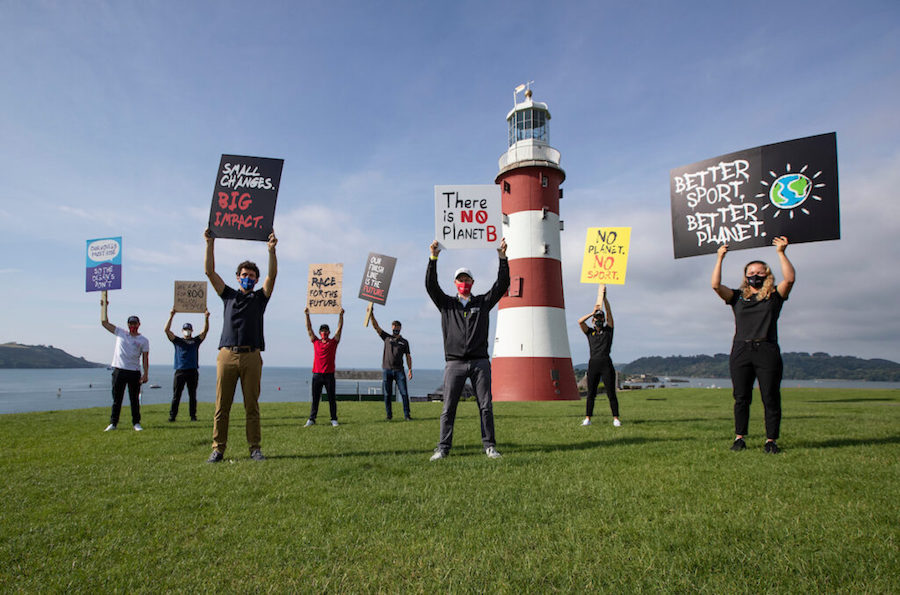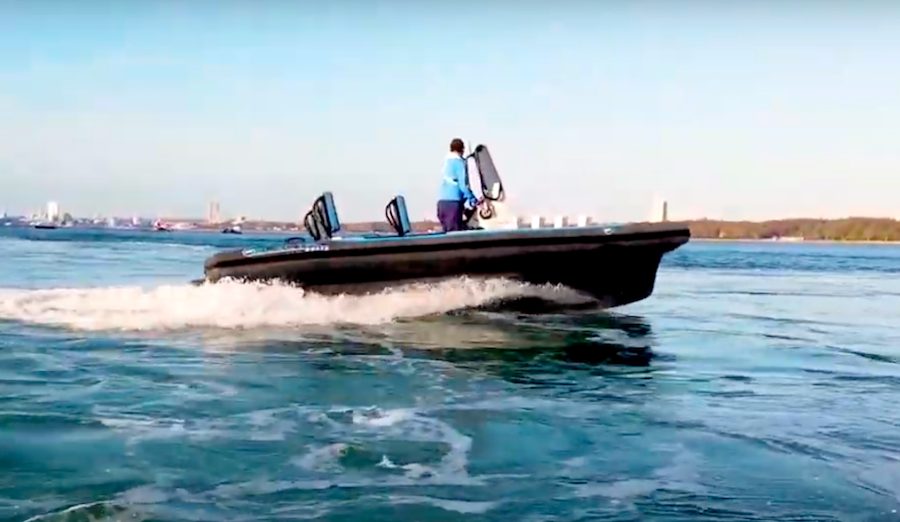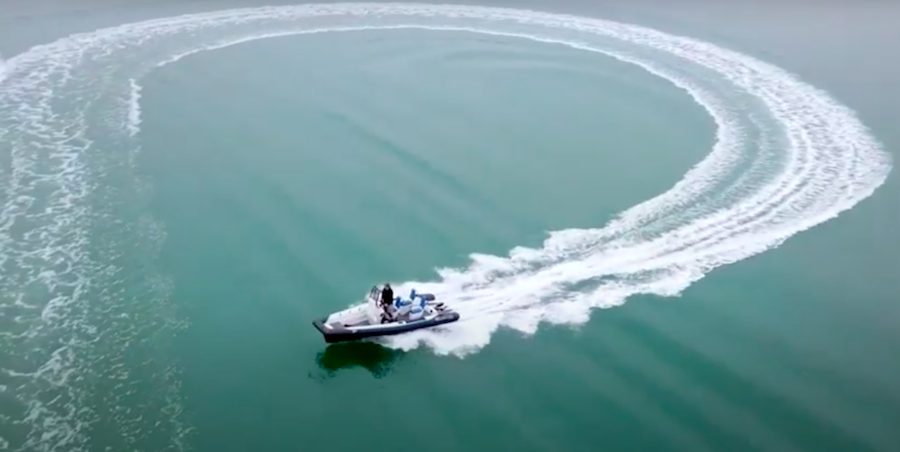SailGP New Zealand finally took an event win in Plymouth as well as winning the SailGP Impact League. This win supports their Live Ocean foundation and SailGP’s renewed commitment to running cleaner events using cleaner power.
NZL for the win
Their success followed a weekend of calculated and skilful racing by Peter Burling’s crew, who picked up a 2-2-1-5-1 fleet racing record in front of bumper crowds on Plymouth Hoe. They beat Australia and Denmark in a frustrating final with shifty wind conditions. And they have moved up the overall leaderboard standings into 3rd place.
Speaking about his first ever win, Peter Burling said the team was ‘stoked to be in [their] first final’.
“I think a lot of people would have expected this of us by now and it’s great to have put together a good weekend, and put in such a dominant performance,”said Burling. “We have been working really hard to improve and I think we truly proved that today. We are just so much more comfortable with the boat now than we have been. It was an awesome effort from the team – it’s been a big push to get to this point but I’m really pleased with the way we’ve been sailing and improving.”
The SailGP Impact League

Athletes representing the eight national teams in the global league highlighting the climate change threat to oceans, and how the SailGP Impact League is part of the solution. Photo: Ian Roman for SailGP. Handout image supplied by SailGP
Introduced for SailGP Season 2, the Impact League tracks the positive actions the teams take to reduce their overall carbon footprint. Plus it helps accelerate inclusivity in sailing.
A second leaderboard, which runs alongside the Season Championship was created to monitor the performance of the teams in the Impact League, with each team’s score at each SailGP event being added to the overall Impact League leaderboard.
At the end of the season there will be two podiums, with the Impact League crowned alongside the Season Champion. The winner will earn funding for its purpose partner, who supports and advises them throughout the season.
How it works
SailGP’s Impact League has a set of sustainability criteria – sustainability, innovation, on-water, merchandise, waste & single-use plastic, travel & accommodation, food, using your voice for good, diversity & inclusion, and collaboration
Each team is awarded points based on its fulfilment of these criteria and is externally audited.
SAILGP – keeping it green
Global sailing events, like SailGP are setting out their sustainable credentials by developing, or utilising, clean power solutions for support vessels by choosing the best electric RIBs and hydrogen powered vessels.
SailGP is chartering electric RIBs for operational roles as part of its support flotilla in the European championship legs. The range requirement for these specific roles is around 20nm, says Tom Verity who looks after the sustainability division of SailGP.
Verity’s looking at the travelling championship’s on-water transition, he’s in charge of getting the flotilla that supports each event – whether that’s hospitality, media, medical boats or more – to be powered by clean energy. The flotilla in Plymouth numbered around 50 boats, with some locally chartered.
Ambitious clean energy targets
With the target set to have a clean flotilla by 2025, Verity has his work cut out. Plus, SailGP needs to transport the absolute minimum between venues, otherwise it’ll undermine its own credentials.
Verity admits the target is aggressive, but he says it’s there to push the organisation, and it will consequently help push the sector forward.
“In the terrestrial sector there are very aggressive targets in terms of phasing out petrol and diesel. But the marine sector doesn’t have that legislation, so the timelines are a lot longer. SailGP’s set our timeline to help private enterprise push that needle of innovation.”
Working together
Tom says that the race is working with, and providing platforms to, innovative technologies that can be harnessed now and into the future. He says the marine sector is in the onset of this energy transition and is relying on private enterprise taking risks, innovating challenges and developing solutions.
“It’s so early on in the journey in the marine world,” Verity says. “The marine industry is 10-15 years behind the terrestrial sector in terms of energy transition. SailGP acts like a sandbox, where companies can bring their clean fuel solutions and test them in an environment with a very high range of requirements – we’re looking for high speed, capacity and confidence to face challenges.”
Electric boats on test
He may have only been in the post for six months, but Verity is pushing forward at speed. SailGP chartered five electric boats this year within the operational fleet in Plymouth. These boats were out all day performing operational roles with challenging range requirements.
One of the companies tested in Plymouth Sound National Marine Park, is the RS Electric. SailGP chartered four of the company’s electric RIBs – Pulses as they’re known.
The RS Electric’s Pulse is unique. “It’s a complete product,” he says. “It’s one of the leading electric ribs out there with the pipelines and the capability to actually deliver electric ribs to the event. The credentials are fantastic, especially the way the technology performs. It’s market leading for the role that we’re chartering it for.” This time around the role was for the media, who need room for a lot of equipment. The ruggedness of its design was one of the attractions – being able to stand-up to wear and tear. It’s more than the clean fuel that attracts SailGP. Verity cites RS Electric’s commitment to manufacturing the boats with sustainability at their core. “That really resonates with the championship,” he says.
Verity says. “Ideally if we could go to an event and charter locally that would be ideal as we wouldn’t have to ship boats around the world, but we’re subject to the availability of the local fleet. How quickly that moves to clean energy will affect how able we are to meet our targets and ambitions ourselves.”
Providing the best electric RIBs with a showcase
Verity says the event will add a lot of value to all the other clean energy providers.
“SailGP provides a link between the marine sector and consumer awareness,” he says. “People have a front of mind appreciation of the need to transition their car towards clean energy. However, transitioning to cleaner energy in the marine sector isn’t top of mind. SailGP can connect the general public with solutions that are helping to decrease carbon emissions of the marine industry. The events provide platforms for existing technologies to meet with the general public, they tell the story of the importance of the transition for the marine sector. It’s a place for electric technologies to showcase operability.”




